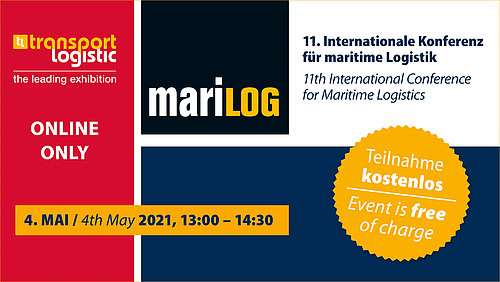The corona pandemic with all its serious effects continues to burden the ocean freight market. The tensions between carriers and shippers are also increasing in view of rising freight rates, declining service quality and a lack of contractual loyalty. But what are these arguments about, how can the problems be resolved and what is necessary so that both sides can find each other again? These and other questions dealt with the participants at mariLOG 2021, which was held for the first time as an online conference as part of the world’s leading trade fair transport logistic from May 4 to 6, 2021.
It was an illustrious group of experts who met in a panel discussion on the first day of the fair at the invitation of the Deutsche Verkehrszeitung (DVZ). In addition to the new Hamburg Süd boss Poul Hestbaek, Rhenus Air & Ocean COO Jan Harnisch and the shipping expert Jan Tiedemann from Alphaliner, Bodo Knop also answered questions from the two moderators Sebastian Reimann and Oliver Link. In his very first contribution, the XSTAFF managing director made both the carrier and the shipper the duty to approach each other again: “Both sides are in the same boat, even if the shipowners are of course currently using the opportunity to optimize profits.” In contrast to Jan Harnisch, who only drew a 4 when the moderators asked for school grades for the shipowners, left Bodo Knop with a 3, also “because both sides contributed to this critical situation with their behavior”. A review shared by discussion partner Poul Hestbaek despite the profit-taking of his company in recent months. In his opinion, establishing freight rates at this level cannot go well, as this development would jeopardize profitability in the long term.
But what options do shipping companies currently have that are not prepared to pay the exorbitantly high freight rates and follow-up costs? For Bodo Knop, the answer is obvious: “Act flexibly and check whether other modes of transport can also be integrated.” A strategy that he has been pursuing with the XSTAFF for months with excellence. Whether by truck over the Silk Road, by train across Asia and Eastern Europe or as a ship charter across the oceans, XSTAFF now uses almost the entire spectrum of options for its transports from Asia to Europe. Poul Hestbaek’s objection that there were often bottlenecks and delayed departures due to a lack of containers could only be accepted to a limited extent: “Of course the costs for a container were high. But those who were willing to accept these costs also received containers. We were ready for it. “
But apart from these short-term solutions, how can the market get into calmer waters again in the long term? If you believe the discussion participants, there are a number of problems to be solved beforehand. While Jan Harnisch called for better communication between the carriers as well as more reliable booking behavior on the part of the shippers in order to facilitate the capacity planning of the shipping companies, fundamental improvements in the cooperation were at the top of the agenda for Poul Hestbaek and Bodo Knop. “In the future, contracts should be drawn up in writing and drawn up in much more detail. This is the only way to get the commitment in the market that is necessary to overcome the crisis”, Bodo Knop is convinced. And when will that be? While Jan Tidemann assumes that it will take some time before this point is reached, also due to urgently needed investments by many market participants, Poul Hestbaek believes that the market will calm down towards the end of the year. Only the next few months will show which of the two is right. It remains exciting.
